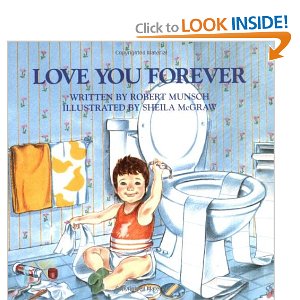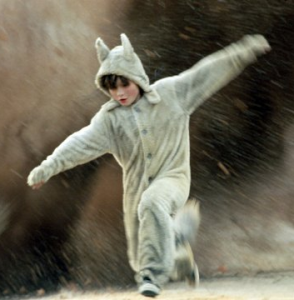(This is the Tantrum, in which Dadwagon’s writers debate one question over the course of a week. For previous Tantrums, click here.)
Do you ever get the feeling that everything we think we know about parenting is wrong? Especially all the stuff that is new to parenting, things that our parents didn’t do and their parents didn’t do and nobody’s parents did stretching back to the misty dawn of history when we were all just monkey parents first climbing out of the trees and trudging with our children, who did not have Razr scooters or 50-point shock-resistant child helmets, onto the alluvial plain?
Well, I feel that way all the time. I second-guess a lot of my decisions, especially the bigger ones I’ve made: raising the kids in the middle of the city, choosing a career that often takes me far from home for too long at a time. And this is doubly true of one of the most elemental decisions any family can make: when to have kids.
Our decision, unequivocally, was this: we waited.
You see, I met my wife in the heart of the Fugazi era, the In on the Kill Taker years, also known as the early 1990’s. She spotted me smoking cigarettes on breaks behind the coffee shop where I worked: something about me must have screamed, now there’s a man who is going to have a multi-decade problem with nicotine. I want in on that action, because she finagled an introduction through a mutual friend. And we went from there.
I was 18 years old, and she wasn’t much older than me. That is sort of shocking every time I think about it, not just because I feel incredibly lucky (and anachronistic) to have someone who is, as much as is possible, a life partner. Like, if we don’t mess this up moving forward, we have the opportunity to have been together for nearly a complete human lifespan. It’s also shocking to me because that means that if we had wanted to, or if we had lived in a post-GOP world where there is no birth control for teenagers, we could have had kids in 1994. My child would be 18, about to make some terrible decisions the night of her prom and hopefully still going to college. Instead of DadWagon, I’d be blogging now on EmptyNesters.com. Instead of writing this post while waiting for yet another load of sheets that my preschooler peed on to finish washing, I’d probably have an amazing roast in oven, be decanting some nice red, about to have a group of fabulous creative unencumbered friends over for a dinner party with my wife that will end with some great stories and then—why not?—a few elegant lines of coke and a trip to a rooftop electronica party in SoHo for well-heeled people who don’t need to wake up at 6am tomorrow to get their tiny fucking children to Kindergarten the next morning.
This is the fantasy that I torment myself with. And mind you, I’m not even as old as my fellow-bloggers. I had my first kid at 30. But that means that right around the time that my youngest is set to go to college (inshallah), I will be hit in the forehead with the 2×4 that is Turning 50 Years Old and then soon enough it’ll be time for apply for an AARP card and get ready for eternity in a mouldering grave.
The thing about waiting, though, was that it was technically the right decision. As my fantasy of life-after-children might indicate, I have maturity issues. My teenaged/20-year-old self was a fair bit worse, and I would have had a hard time making good decisions for a child. And then there’s the question of education, and career, and the sacrifices one makes for mammon throughout the 20s. In agrarian or hunter-gatherer societies, I would have had to kill a bear at the age of 18 and eat its gall bladder* then basically my education and transformation into manhood would have been complete. In the information economy, however, I needed to finish my four (okay, five) year degree, follow my wife around the country as she got advanced professional degrees, all the while hanging around on the fringes of a major media organization waiting for my big shot. In short, I was broke and professionally unstable, and now that I’m a highly-paid dadblogger, I’m a better parent.
That’s what I think, at least. The truth is—and here, finally, is where we get to the actual topic of this tantrum—that young parents can be amazing parents. I know that from my middle-aged vantage point, it’s tempting paint younger parents as chronically unfit, the kind of people who make the evening news, who smoke weed and drive off with their baby in its carrier still on the roof of their car. There are those types of idiots, sure, but I’ve seen young parents who also do a great job. and all that chaos and instability that goes with being young can make the bond between parent and child even more elemental. They can be tough for each other, bond more deeply, become a more integral part of a joint life because, at 22 or whatnot, your life isn’t really formed at all yet.
And that gets to the heart of this question of old vs young parenting: Do you want your children to arrive onto a stage that has already been set (older parents)? Or do you want them to arrive early into a life that is still being assembled (younger parents)? I think there are benefits and drawbacks to each, but kids don’t need nice cars or stable incomes nearly as much as they need parents who put them at the center of existence. If a child arrives and is just intruding on what was otherwise a very trim and organized existence, as it seems with some older parents I know, then whom does that help?
Mainly, I long for a touch of anarchism to all of this, and that there’s a powerful case for having them young. Screw conventional wisdom. Be a teen parent. Just to prove Ted and Matt wrong.
*Note: I have no idea what I’m talking about.


 This morning started out as a normal morning. I went into Sasha’s room at about 7:20 to get her up, and she told me she wanted to get dressed. No, not that dress, she said, the flower one—the one that’s probably too light for today’s wet weather. Whatever. I helped her into clean undies and put the flowery dress over her head.
This morning started out as a normal morning. I went into Sasha’s room at about 7:20 to get her up, and she told me she wanted to get dressed. No, not that dress, she said, the flower one—the one that’s probably too light for today’s wet weather. Whatever. I helped her into clean undies and put the flowery dress over her head.
